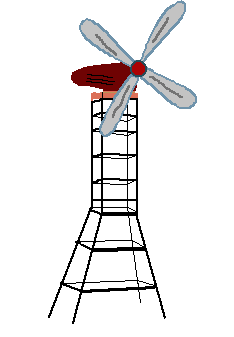ENERGY SOURCES: RENEW! RENEW!
- GOAL:
- The student will understand the difference between renewable and nonrenewable energy sources and will be able to describe the abilities of each.
- OBJECTIVES:
- The student will be able to:
- 1. Define renewable and nonrenewable energy sources.
- 2. List and describe types of renewable and nonrenewable energy sources.
- 3. Discuss the role of renewable energy sources in the future.
- LESSON / INFORMATION:
- Energy is classified into two categories -- renewable and non-renewable energy sources. Energy from renewable sources can be replaced in a short time period. Non-renewable energy sources, however, require millions of years to replace.
- ACTIVITY 1:
- Mark the following energy sources with a "R" for renewable or with an "N" for non-renewable.
- 1._____Petroleum (oil)
- 2._____Coal
- 3._____Solar power (sun)
- 4._____Wind
- 5._____Natural gas
- 6._____Hydropower (water)
- 7._____Geothermal (heat from the earth)
- 8._____Biomass (plant and animal materials and wastes)
- Fossil fuels is another term for nonrenewable energy sources. For the past several decades, there has been a concern that the world may be running out of fossil fuels. Once these fuels are depleted, they will take millions of years to replace.
- This concern has sparked efforts to find energy sources that are easily renewable or virtually inexhaustible. Many of these renewable energy sources are also less toxic to the environment.
- The basic types of renewable energy under study use the sun, wind, water, or plant and animal materials to produce energy.
- Solar Energy is one of the renewable energy sources that has the most potential. Sunlight can travel through air, clear glass, and plastic. When the sun strikes a surface, light energy is either reflected or absorbed. It is the absorbed light energy that gets changed into heat and can be used for power.

- Passive solar energy systems make use of solar energy without using special equipment. For example, a house may be built to direct the sun onto a thick masonry wall that then stores the heat for later distribution.
- Active solar systems require the use of mechanical collectors to absorb the heat of the sun. This energy is then stored or distributed using fans, pumps, or other equipment.

- Wind Energy is another type of renewable energy source with much potential. Wind is produced as the sun heats the air. Warmer air rises and cooler air sinks. This air motion is the wind. Windmills were used until the late 1930s to produce electricity. Today's wind turbines look like airplane propellers and can be used to generate energy in areas with steady winds that average at least 12 to 15 miles per hour. Louisiana, therefore, is not an area that can produce much wind power. California is quite successful, however, and 90% of U.S. wind power is produced in that state.

- Hydropower is created by the flow of water. It is used to drive water turbines that produce energy. In the past, the waterwheel was used to produce energy for such tasks as cutting lumber or milling wheat. Today most hydropower is found on rivers where dams have been built. This way the flow of water, and thus energy production, can be controlled. Hydropower accounts for about 50% of the renewable energy used in the U.S. today.

- Geothermal Energy uses heat generated below the earth's surface to produce energy. Four sources of geothermal energy include hydrothermal reservoirs, geopressured reservoirs, hot dry rock resources, and magma resources. Direct applications for geothermal energy include providing heat for groundwater and agriculture in cold climates, enhancing aquaculture, or producing electricity. Geothermal energy is sometimes hard to locate and may contain harmful chemicals or gases.

- Biomass is a fuel obtained from plant sugars and starches. Biomass includes wood, leaves, crop residues and even animal wastes. These materials can be burned directly for energy, as wood is in a fireplace. These materials can be converted into liquid fuels such as the ethanol added to gasoline. Finally, biomass can produce methane gas which can be used like natural gas.

- While all of these renewable energy sources provide hope for energy stability in the future, each has its own problems. Most of these types of energy cost more to produce than the fossil fuels used today. Until fossil fuel reserves are depleted, or until the public demands more energy options, these renewable energy sources will not become readily available.
- ACTIVITY 2:
- Complete the matching exercises below. Each answer is used once in each set of the exercise.
- A. Solar Energy
- B. Wind Energy
- C. Hydropower
- D. Geothermal Energy
- E. Biomass
- Set A.
- _____1. Gives heat to natural hot springs
- _____2. Used today in calculators and watches
- _____3. Used in gasohol
- _____4. Powers a sailboat
- _____5. Turns turbine to produce electricity
- Set B.
- _____1. Could not be found in the desert
- _____2. Could have people growing fuel
- _____3. Could add to your home during a remodeling project
- _____4. Could not be used where weather was unpredictable
- _____5. Could bring up dangerous chemicals
- Set C.
- _____1. Must dry it before use
- _____2. Might be too deep to recover
- _____3. Could use active or passive
- _____4. Would need reservoir that might upset animal habitat
- _____5. Could group these "propellers" in a desirable area
- RESOURCES:
- Florida Middle School Energy Education Project. I. Energy Production. Florida Solar Energy Center, Cape Canaveral, FL, 1989.
- Global Warming and Energy Choices: A Community Action Guide. CONCERN, Inc., Washington, D.C., 1991.
- U.S. Department of Energy. Renewable Energy: An Overview, FS 175, 3rd edition, 1990.
- U.S. Department of Energy. The Energy Challenge. n.d.
- INFORMATION CHECK
- 1. List the three most used sources of energy. They are all fossil fuels.
- a.
- b.
- c.
- 2. List and briefly define the five types of renewable energy. Also give one example of how that energy source is already being used today.
- a.
- b.
- c.
- d.
- e.
- 3. Discuss some reasons why these renewable sources are not yet widely used today.
- TEACHER'S NOTES
- ACTIVITY 1:
- 1. = N
- 2. = N
- 3. = R
- 4. = R
- 5. = N
- 6. = R
- 7. = R
- 8. = R
- ACTIVITY 2:
- Set A.
- 1. = D
- 2. = A
- 3. = E
- 4. = B
- 5. = C
- Set B.
- 1. = C
- 2. = E
- 3. = A
- 4. = B
- 5. = D
- Set C.
- 1. = E
- 2. = D
- 3. = A
- 4. = C
- 5. = B
- DEFINITIONS:
- 1. Electricity - This is not discussed as an energy source in this unit. This unit deals with primary, or natural, energy sources. Electricity is a secondary energy source. It is derived from a primary source.
- 2. Energy - Energy is something that causes a change in matter. The forms of energy are light, heat, motion, sound, electricity, chemical energy, and nuclear energy. Energy cannot be created or destroyed but it can be changed from one form to another.
- 3. Fossil Fuels - These refer to the three basic nonrenewable energy sources -- petroleum, natural gas and coal. It took millions of years for these fuels to form.
- ANSWERS TO INFORMATION CHECK:
- 1. petroleum (oil), natural gas, coal
- 2.a. Solar energy is produced when light energy is absorbed and is changed into heat and used for power. Ex: watches, calculators, home heating
- b. Wind energy is produced when wind turns turbines that are used to generate electricity. EX: propel sailboat, produce electricity.
- c. Hydropower is energy produced from falling water. Today this is usually harnessed by building dams on rivers. EX: mill wheat, produce electricity
- d. Geothermal energy comes from heat trapped under the earth's surface. EX: heats hot springs, steam and hot water used for heating or to produce electricity
- e. Biomass is energy that comes from using plant and animal material and waste. EX: burning wood for heat or using corn to produce ethanol.
- 3. Some reasons why renewable energy sources are not being widely used today include:
- - Fossil fuels still available.
- - Most renewable energy sources cost more than fossil fuels to produce.
- - More research needed.
- - People not demanding more energy options.
Comments or questions to: TechAsmt@LA.GOV
Return to Home Energy Menu











